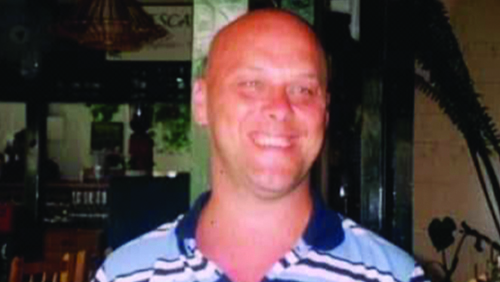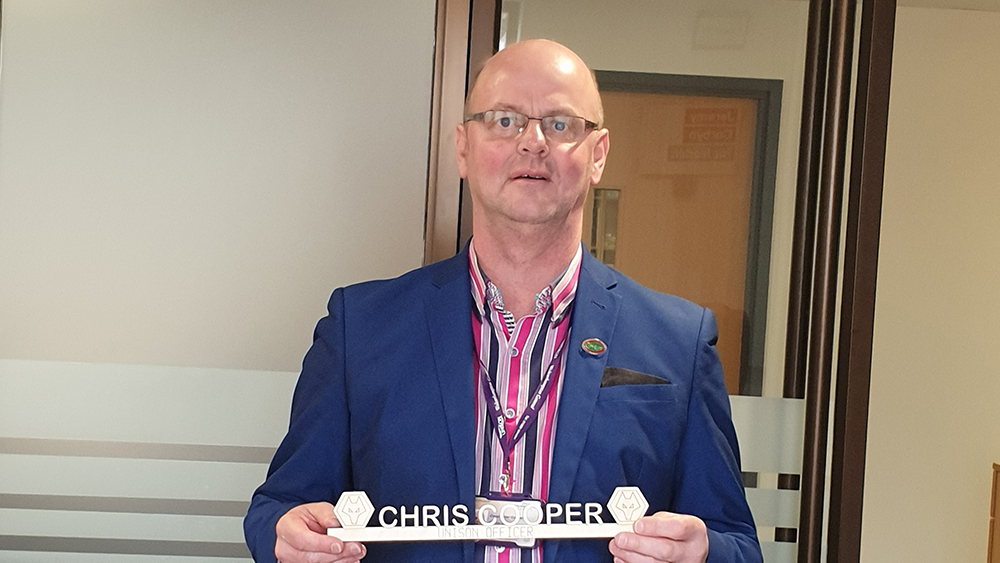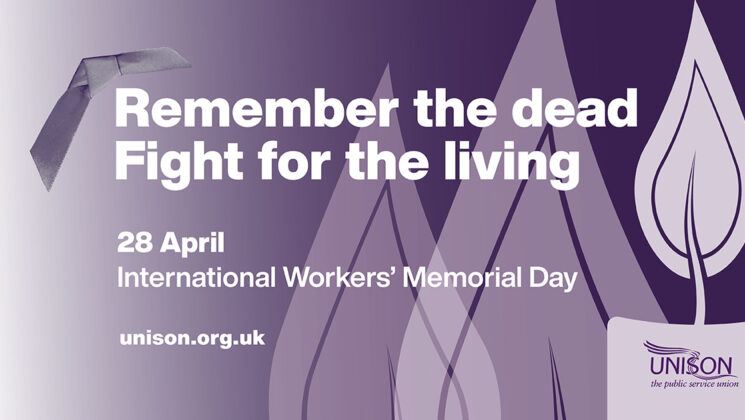For Chris Cooper, International Workers’ Memorial Day, which is held each year on 28 April, holds particular poignancy.
Sixteen years ago, in 2006, his cousin Terry was working in a foundry in Oldbury in the West Midlands. “He was sitting having his lunch,” explains Chris. “The manager came in and said: ‘Have you seen so and so? We want this vehicle unloading’.”
Terry hadn’t seen his colleague, but told the manager: “If you want me to unload it, I’ll unload it and I’ll have my dinner later”.
Unloading pallets of copper tubing from the truck with a forklift, Terry was on the last one, when “the driver came out of the office with his paperwork, didn’t look, jumped straight into the cab and, as it was pulling away, the back end of the truck caught the forks and it tipped the forklift over,” killing him.

Terry, pictured three days before his death
Terry had only been married six weeks. “When we went to his funeral, with my partner Rita, that was the first time ever I’ve seen a vicar get upset,” Chris remembers.
“He stood there and he says: ‘I shouldn’t be standing here doing this – I’d only married Terry and Beverley six weeks ago’.”
Chris had only been with Rita a month and, a week before the accident, they’d been to a 60th birthday party for Terry’s mother.
“Terry was over the moon I’d met Rita. ‘About time you found happiness’ he said. And I will never forget the phone call the week after, when my other auntie rung me up and said: ‘Have you heard about Tez?’”
Chris describes the shock, how his body felt utterly drained of energy and how he couldn’t speak when Rita asked him what was wrong.
Terry was survived by his new wife and three children – two by a previous marriage and one that he and Beverley were in the process of adopting.
Galvanised
It’s hardly surprising when Chris says that, even after all these years, the memory of his cousin’s death “is still a bit raw”.
But the accident and its fatal consequences galvanised him.
He’d become a union rep shortly before the accident, but hadn’t been involved in health and safety.

“It sprung me into life,” he says, adding that he started thinking that it could have been some of his own workmates, and asking himself what he could do. Becoming a health and safety rep was an obvious move.
In the years since, he and his fellow activists have secured improvements at their employer, Wolverhampton City Council. There’s been new toilets and new flooring, while the lights are now on sensors. “Only because we pushed and pushed and pushed,” Chris stresses.
In 2016, they negotiated with the council that any time off for health and safety wouldn’t come out of facility time. That had taken two years, but “if you put in the graft and the hard work,” you can make a difference, he says.
The same year, he and a colleague who is now retired received an award for their health and safety – something he remains hugely proud of.
He worries that, after Brexit, the UK government will attack employment rights – not least health and safety regulations – in the name of scrapping ‘red tape’.
“Since what happened to our Terry, I don’t want another family to go through what we went through. The changes we’ve made in our own workplace – if we hadn’t have been in the union, we wouldn’t have been able to do that.”
Sharing his story
For the last 12 months, Chris has been the health and safety officer for the West Midlands region, while he’s also a member of UNISON’s national health and safety committee.
He attends meetings of the Hazards Campaign, which supports those organising and campaigning for justice and safety at work. And, COVID-19 permitting, he has been asked to speak at this summer’s conference to tell his and Terry’s story, with the blessing of Terry’s family.
“After the heartbreak of losing him, they’ve said: ‘We appreciate what you’re doing, Chris’. They’re happy for me to tell Terry’s story and I’m happy to do so.
“I love to share this information – and I do – because I still want to keep making changes in the workplace, because a unionised workplace is a safer workplace. And when non-members say: ‘What can the union do for us?’ I keep banging on that it was unions that won the 37-hour week, better working conditions and health and safety policies in place.”
In the last few months, together with his fellow activists Marcia Shakespeare and Gurdeep Singh, and regional organiser Tracey Wood, he has been involved in making a video to encourage people to become health and safety reps.
“I want to use it as a recruitment tool, to bump up our density level,” he notes.
He talks more of Terry, his darts-loving, Wolves-supporting cousin, mischievous and fun, who would always go the extra mile to help anybody.
“That day… that day, I only wish he’d have finished his dinner,” he says, welling up.
At the heart of the matter
Chris and Terry’s stories get right to the heart of what International Workers’ Memorial Day is about: ‘Remember the dead, fight for the living’.
Every year, around the world, more people are killed at work than in wars. Most don’t die of mystery ailments or in tragic ‘accidents’. They die because an employer decided their safety just wasn’t that important a priority.
According to the Health and Safety Executive, in the year 2020-21, in Britain, 142 workers died doing their jobs, with 60 members of the public also killed as a result of a work-related accident.
In the same year, there were 1.7million working people suffering from a work-related illness – from mental health problems to musculoskeletal disorders to COVID-19 believed to have been contracted while at work.
Some 441,000 working people sustained an injury at work, according to the Labour Force Survey.
A further 2,369 people died of mesothelioma due to past exposure to asbestos.
However, the true picture on work-related deaths could be even higher, with the Hazards Campaign estimating that 5,000 are killed by work yearly. Find out more here.
But while it is vital to remember those who have died, that’s only part of the campaign – the other, equally vital part, as Chris makes so clear, is to fight for better health and safety in our workplace, to reduce that toll.
UNISON is committed to making workplaces as safe as possible. And you can help to achieve that, and to help create a world of work where there are no more grieving families.
Find out more about becoming a health and safety rep
Learn more about the Hazards campaign
View the West Midlands’ five-minute film

